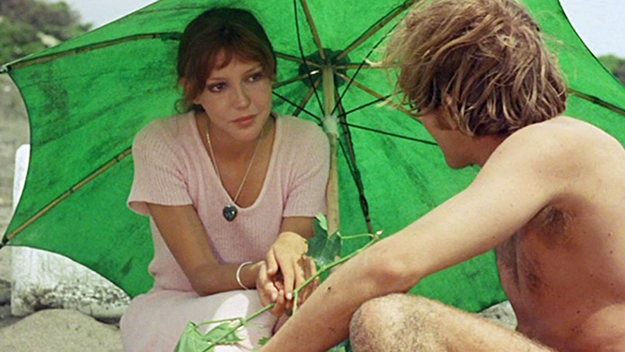Film Comment Recommends: The Seed of Man
This article appeared in the June 15, 2023 edition of The Film Comment Letter, our free weekly newsletter featuring original film criticism and writing. Sign up for the Letter here.

The Seed of Man (Marco Ferreri, 1969)
In Marco Ferreri’s bleak 1969 fantasy The Seed of Man, a young couple lead an eerily idyllic life in a remote beachside house after an apocalyptic event wipes out much of the population. The young man, Cino (Marco Margine), has created a museum filled with objects from the world that once was (including a record player and a large wheel of parmesan cheese); meanwhile, the young woman, Dora (Anne Wiazemsky), happily gives herself over to the day-to-day. A conflict arises, though, when Cino pressures Dora to have a child—something that she believes they have no right to do.
The Seed of Man, with its recontextualized pop imagery, unsettling sonic dissonance, and vision of life after Armageddon, brings to mind a film by George A. Romero remade by Jean-Luc Godard. At its core, it is an indictment of male domination and the brutal drive for procreation, and Ferreri, whose work sometimes takes a feminist view of patriarchal oppression (The Future Is Woman, The Conjugal Bed), follows these themes to a devastating conclusion before the literally explosive, Monty Python–esque final moment.
Building off of this simple but highly charged premise, Seed is filled with the surreal images Ferreri is known for. In a brilliantly satirical scene, what Cino and Dora think is a dirigible coming to save them turns out to be a giant balloon advertising Pepsi-Cola. On television, black-and-white news footage shows the Vatican in ruins, with La Pietà decapitated. Eventually, a giant white whale washes up on shore (an image that prefigures both Ferreri’s own Bye Bye Monkey and Béla Tarr’s Werckmeister Harmonies), the stench of its rotting corpse forcing them to leave their home. Ferreri’s film has a spooky charm owing to its lonely setting and fairy-tale plot, but in its many moments of unflinching critique, it offers a grand buffet of pure provocation.
Chris Shields is a filmmaker and writer who lives in Los Angeles.







